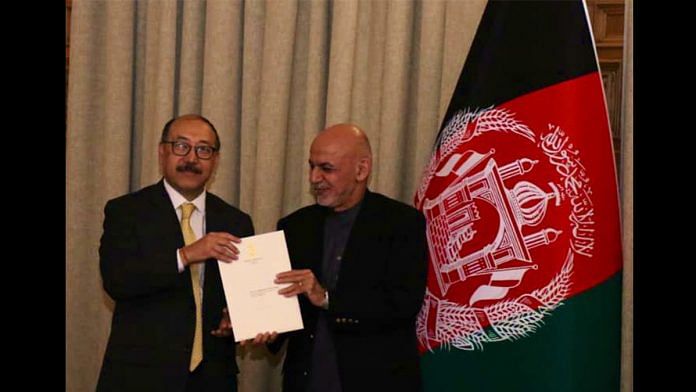 The Ladakh warning
The Ladakh warning
P. Stobdan | Former ambassador, expert on India-China affairs
The Indian Express
With rising tensions between India and China at the Ladakh border, Stobdan notes, “India must be alert to a larger strategic shift.” Citing China’s criticism when Ladakh was declared a Union Territory after the abrogation of Article 370 and 35(A), Stobdan notes how the border troubles have been rising and the People’s Liberation Army of China is desperate “to snatch the lake at Lukung through a three-pronged strategy of attacking from Sirijap in the north, Chuchul in the south and through the lake water from the middle,” he adds. These patterns could prove disastrous for India and puts the entire Indus Valley under Chinese threat.
 The Pashtun question
The Pashtun question
C. Raja Mohan | Director, Institute of South Asian Studies, National University of Singapore
The Indian Express
“Delhi needs to look beyond the question of engaging with the Taliban and focus on the larger Pashtun question that once again promises to shape the geopolitics of the north-western Subcontinent,” argues Mohan. While public interest in talks with the Taliban was renewed after US President Donald Trump announced significant drawback of forces, the Pashtun question “holds the key to India’s enduring interest in Afghanistan.” He notes that there are two basic issues in the ‘Pashtun question’ that will have a huge bearing on Afghanistan’s political equation — one is reconciling the interests multiple ethnic groups in Afghanistan and the other is forming an internal stable government to do so.
 Cash transfers: There is a way out
Cash transfers: There is a way out
Yamini Aiyar | President and chief executive, Centre for Policy Research
Hindustan Times
Aiyar calls out the government for failing to provide cash relief to migrant workers as the lockdown enters its fourth phase and argues that “The Centre’s defence about lack of data on migrants is weak. It is possible to identify them.” Stating that local bodies like the gram panchayat and turning ration shops into registration centres can help account for many migrant workers who have otherwise slipped through the cracks. However, Aiyar adds, “These lists will not be exhaustive, and there may be a duplication of names. But they are a starting point.” To ease direct cash transfers, she adds, “States should be allowed to work out the delivery mechanism.” Aiyar notes that her recommendations are not without their own problems and loopholes, but the point she tries to drive home is: “Don’t wait for the perfect database. The bare bones are in place. It can be done now.”
 Bengal’s Amphan tragedy needs more national and global attention
Bengal’s Amphan tragedy needs more national and global attention
Boria Majumdar | Columnist
The Times of India
As Kolkata and other parts of West Bengal were struck hard with Cyclone Amphan amid a global pandemic, Majumdar urges for the same “national unity and global solidarity” that is thriving to fight Covid-19 to help save the cyclone ravaged areas. Urging for civilian efforts, he notes, “To expect that the government will mount all relief efforts is a mistake. The government can’t. It doesn’t have the means and never will.” As the state slowly crawls back towards normalcy, Majumdar ends by noting, “If there could be global synergy for the Australian Bushfires, there is no reason why the world can’t come together for Bengal.”
 Covid-19 crisis: Unemployment rate remains high at 24.3% amid lockdown
Covid-19 crisis: Unemployment rate remains high at 24.3% amid lockdown
Mahesh Vyas | MD & CEO, Centre for Monitoring Indian Economy Private Ltd
Business Standard
Vyas analyses the unemployment data and labour force participation rates and notes that a significantly large chunk of the labour force is returning. The data suggests that those who are not actively looking for jobs, will join the labour market if employment opportunities improve marginally. We have made significant progress in terms of job repairment but the challenge of unemployement is five times larger, notes Vyas.
 The means and ends of a policy should not be confused
The means and ends of a policy should not be confused
Shruti Rajagopalan | Senior research fellow, Mercatus Center at George Mason University, US
Mint
The government has started to treat the lockdown as a policy itself, which was supposed to buy more time to scale up the healthcare capacities, writes Rajagopalan. The goal to ‘flatten the curve’ has been forgotten and “each version of the lockdown seeks to improve upon the mistakes of earlier ones”, she notes. We need to keep reminding the government its original goal, writes Rajagopalan and notes that the lockdown should be clarified as a policy means and not the end in itself and significant improvement in healthcare infrastructure is the required policy action.
The Centre’s Kashmir policy and a heavy price to pay
Radha Kumar | Author, ‘Paradise at War: A Political History of Kashmr’
The Hindu
Kumar argues that the Modi government’s recent policies in Kashmir are being perceived as disastrous in the Valley, garnering mixed reactions in Jammu and Ladakh, and are welcomed by some in the rest of India. The latest are the new domicile rules enacted on 18 May. The new rules “entitle anyone who has worked or lived in the State for 15 years, or studied there for seven years, to receive a domicile certificate and the benefits previously reserved for permanent residents,” writes Kumar. She states these rules show a clear bias of the central government to favour not only Union government officials but also their children. The Centre’s argument that the new domicile rules were necessary for marginalised groups such as refugees from west Pakistan, is ill-founded, Kumar writes. Due to these policies, India will have to face “mounting security threats on its western front”, warns the author.
Towards a desi spaceX
Pallava Bagla | Science communicator, author
Financial Express
The author calls Finance Minister Nirmala Sitharaman’s announcement including the private space sector in India’s space journey as “jarring at one level and music at another”. ISRO has a “love-hate relationship” with the private sector and refuses to give up control, but the recent announcement may work as a catalyst, the author notes. However, the possibility of future interplanetary exploration sounds jarring at a time when the world is in the middle of a pandemic, Bagla writes. However, If the ISRO is serious about this new push for privatisation, then it should introduce the ‘space law’ in Parliament in the Monsoon session, Bagla suggests.



